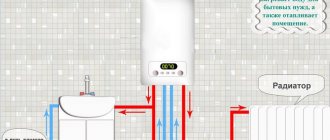It is quite possible to endure some time without household appliances and TV. The situation is much more serious if the operation of the gas boiler is interrupted during a power outage, even for a short period of time. It is especially unpleasant if the start-up of the power grid is delayed for an indefinite period. Do you agree?
On the forums, many craftsmen claim that if the electricity supply is stopped and the gas equipment is turned off untimely, the boiler may break down. It’s even worse if carbon monoxide, which is life-threatening, leaks into the room. Are you ready to take such a risk or is it still better to abandon an electrically dependent heating source?
We won't let you freeze or empty your pockets by spending money on useless activities. We will tell you in detail about what will happen to a gas boiler if the power supply is suddenly turned off. You will learn how to ensure uninterrupted operation of even the most expensive unit packed with electronics.
Which boiler elements depend on electricity?
Power outages to houses not only in the outback, but also in cities occur quite often. They happen due to emergencies, planned repairs and technical work, and breakdowns on the line. And the most unpleasant thing is that when the electricity is turned off, the operation of the gas boiler is paralyzed if it is of the volatile type.
The non-volatile gas boiler continues to function as usual, even if there is a power outage on the power line. The only exception is if a pump works in conjunction with it, and a gravitational coolant circulation system is not provided.
Non-volatile boilers have the simplest, basic set of functions. They are less comfortable to use than their energy-dependent counterparts. But their operation is absolutely independent of energy supplies to the home electrical network, and they are less likely to fail
In a heating circuit with a boiler of the simplest type, the set of basic elements is something like this:
- smoke removal system with natural draft;
- heat exchanger;
- gas burner with nozzles for supplying gas, which is located in the combustion chamber;
- gas supply and ignition unit;
- expansion tank;
- mechanical temperature sensor;
- control module, which includes a boiler ignition system (mechanical or piezo), temperature control;
- safety group (safety valve, pressure gauge, air vent).
Volatile devices are more complex in design. But is electricity really necessary and important for the operation of a gas boiler?
Depending on the model and brand, in addition to the same basic set of elements, in some cases electronic and automatic, they may provide such functions as:
- forced ventilation system;
- built-in circulation pump;
- electronic system control module;
- shut-off and control valves with electric drive;
- various sensors - water flow, temperature, flame supply, water pressure in systems, manostat, emergency complexes;
- piezo ignition unit with electric drive;
- automatic temperature regulators;
- notification and remote control system;
- display showing the current performance indicators of the device
Units of this type are more reliable and much more convenient to use, and in addition, they are economical. You can set the automation to turn on and off, reducing fuel consumption, create a comfortable microclimate at home, and not worry about safety and performance.
Modern boilers are crammed with electronics. When choosing a device, also install a voltage stabilizer to protect against surges in the network
The only negative is that after a power outage, the volatile gas boiler will not be able to fully operate. It is difficult to say which functions will be completely absent; it depends on the boiler model. Some units have a combined control system - mechanical and electronic.
It is certain that forced ventilation, automatic adjustment of the flame supply to the burner, pump, display, electronic control module, in general, all devices operating on an electric drive and a constant current supply will not function.
But is everything so scary?
Features of non-volatile gas boilers
Features of non-volatile gas boilers
If we talk about this technology in more detail, it should be noted that hot water is not supplied to the consumer from the water supply, but the water is directly heated in the internal circuit of the consumer.
For example, if you have a non-volatile Proterm Medved gas boiler installed, then if the central power supply is completely turned off, it will only be able to maintain normal operation on the ignition burner for more than half an hour, and then it will completely turn off due to the fact that the exhaust fan stops working and therefore the corresponding traction sensor is activated.
Until electricity is supplied again, it is impossible to turn on the device again, but it is worth noting that outages can be quite long, and this must be taken into account.
So that during a long power outage you do not need to be left without a working gas boiler, consider purchasing an uninterruptible power supply in advance. It should be noted that in itself such independence from the central power supply is a very good property. However, the practical implementation of such equipment is accompanied by a huge number of problems associated with installation and subsequent operation.
What are non-volatile boilers?
The vast majority of non-volatile boilers, such as non-volatile gas boilers Electrolux, reviews of which are not difficult to find online today, are floor-standing devices, but recently wall-mounted devices have become more and more widespread.
In particular, this is due to the need to install boilers at the bottom of the entire system due to the fact that in the complete absence of any specialized pumping equipment in the system, a full cycle of proper water circulation was still provided, because the pump requires an electrical supply.
Moreover, if a truly qualified specialist is designing the entire system, such features of the heating system can, through heating, ensure optimal pumping of water. In this regard, any such boilers are often installed exclusively in the basement.
The design of a non-volatile double-circuit gas boiler is exactly the same as that of a standard one. This:
- open combustion chamber providing increased thrust;
- two burners;
- security and automation system. This includes a backdraft valve, which ensures shutdown in case of poor performance, as well as a temperature sensor to maintain the mode;
- combustion product removal system.
One of the features characteristic of this type of device is the presence of specialized hand-held piezoelectric elements, as well as the fact that during their operation exclusively natural traction is used.
Among other things, it should be noted that modern non-volatile boilers are manufactured in two main varieties:
Most modern devices do not even provide the ability to connect to an electrical network, but it is worth noting the fact that among the widest range on the current market, you can easily buy devices that are manufactured by both domestic and foreign manufacturers.
Are power outages dangerous?
Sellers of non-volatile appliances and uninterruptible power supplies tell customers chilling stories that look quite plausible. A person who does not understand anything at all about the design of a boiler will believe that if the current is lost, the gas supply to the burner continues.
What's really going on? When the temperature sensors, electronic control unit and pump are turned off, uncontrolled combustion of fuel occurs in the combustion chamber, which means overheating of the liquid in the heat exchanger.
Accordingly, the tubes cannot withstand, they become deformed, burst, and the water from them extinguishes the burner of the atmospheric gas boiler. Gas enters the room and creates an explosive situation or simply poisons people and animals. And if a forced-air ventilation system is installed in the boiler, go outside. This is also unsafe and not environmentally friendly.
Do you agree that it sounds plausible and scary? Have you already decided to run for a non-volatile boiler? But in vain!
Do not avoid performing maintenance on gas appliances and their components. Checking will show their performance, especially after power outages
In fact, electrically dependent boilers occupy a leading position in the sales market. They are installed in holiday villages, private houses, with owners spending half a day at work, and in non-residential premises where long-term repairs are being carried out.
Power outages, as mentioned earlier, are quite common. And for some reason there is no data on hourly large-scale tragedies of carbon monoxide poisoning or explosions.
Moreover, such a dangerous device would not be certified and could not in any way comply with GOST, which means that gas workers would not allow it to be used.
And now the technical details. In fact, the devices have a reliable system that ensures that the boiler is turned off in the event of force majeure, including a power outage.
Equipment installation rules
Most energy-independent boilers are produced as floor-mounted boilers. It is imperative to arrange a separate room for the equipment. But this is also important for wall-mounted models, since the devices burn out oxygen, taking air directly from the room.
The exception is parapet boilers, in which the combustion chamber is closed and oxygen is taken from the outside (for this purpose, an outlet is provided through the outer wall).
During installation, it is important to ensure normal pressure in the gas line. In most residential buildings it is 50 mbar, but for a non-volatile boiler 13-15 mbar is sufficient. But in some regions this indicator is characterized by sharp changes. In such cases, it is better to refuse to install non-volatile equipment.
Gas shut-off safety devices
As part of the automation of a gas boiler, a shut-off valve, popularly called simply a cut-off valve, is often used as a fast-acting shut-off system. Unlike other shut-off valves, the valve operates automatically.
Its main purpose is to supply gas to the burner with the required pressure at a given power and completely stop the fuel supply in the event of a malfunction. This process is carried out using monitoring devices with built-in sensors.
Gas piezo blocks are non-volatile, but can be used for both types of boilers
Automation differs in the type of ignition - there are piezo ignition and electric ignition.
Piezo ignition is when the start is done manually by pressing a button. It controls the operation of the flame - a thermocouple, which is heated by the igniter and, generating a direct current, ensures the open state of the valve.
As soon as, for some reason, the pilot burner stops supplying an open flame, the solenoid valve closes and the gas flow stops. Piezo ignition is an energy-dependent element of automation.
The electric ignition unit is connected to the power supply. Starting is carried out from an electric spark in automatic mode. This system is volatile and when the current is turned off, the valve of the device shuts off the gas supply.
It looks something like this. The differential relay has two contacts. During normal operation of the heater, one block is closed. When any change occurs in the operation of the boiler, for example, the power is turned off, the second unit is activated, and the first one opens. The relay moves, the membrane bends and the gas supply is cut off.
Boiler operation during power outages
Boiler operation during power outages
Post by shulyan » Mar 13, 2013, 05:22 pm
Hi all! Please tell me how the Baxi Mainfour 240f boiler behaves during: 1. a power outage? 2. Voltage drops? 3. renewed tension?
As I understand it, when there is a shutdown and fluctuations, the boiler simply shuts off the gas and turns off. So? Is the boiler capable of turning on itself after the electricity is restored? Or will he wait for the owner to press the right button?
Re: Boiler operation during power outages
Post by BAXI-Ural » March 13, 2013, 07:13 pm
Re: Boiler operation during power outages
Post by RADAR » Mar 13, 2013, 10:54 pm
Re: Boiler operation during power outages
Post by shulyan » Mar 14, 2013, 01:57 pm
Re: Boiler operation during power outages
Post by Bahus » Mar 14, 2013 03:25 pm
Re: Boiler operation during power outages
Post by RADAR » March 14, 2013, 4:05 pm
Re: Boiler operation during power outages
Post by shulyan » Mar 14, 2013, 4:14 pm
Re: Boiler operation during power outages
Post by RADAR » March 14, 2013, 4:16 pm
Re: Boiler operation during power outages
Post by Vitalik_ » Mar 22, 2013, 12:33 pm
When the electricity is turned on, the boiler will start and work automatically without the intervention of the owner. Another question is that the boiler needs to be protected from voltage surges.
Thus, it is advisable to use a good stabilizer with the boiler (to protect the boiler electronics), preferably a gas filter (to prevent clogging of the gas valve).
This applies to all gas boilers
So not only there
Sent after 29 seconds: But this has nothing to do with the boiler.
Hello. I set the parameter H91=0 in the boiler settings. I set 3 time periods for the boiler to operate in the GSV mode. Everything worked perfectly, but today for some reason the boiler first switched to the GSV in the middle of the day.
Also, while watching the boiler, I discovered that after working according to the schedule on the FGP, it did not want to switch to the heating mode.
I did not change any settings on the boiler, except for parameter H91 + setting time intervals for turning on/off the DHW.
Help me figure out what happened to him?
All the best and Happy New Year
The actual subjects of discussion are in the title. The umbrella is connected via KHG71407251 I connected it only last night. I connected it according to the instructions to the boiler and to the Umbrella (the jumper was removed)
The boiler is not new (>10 years old) in conjunction with a boiler (also Baksi), but the heating of the boiler is turned off by the regulator (there is a bypass line through which part of the water from the heating circuit goes to heat the boiler, so I don’t turn it on, but in fact the DHW is heated, of course)
There is only one temperature sensor near the Umbrella, but...
Who's at the conference now?
Currently browsing this forum: no registered users and 2 guests
- Articles
- First things first
- Collection of GSM informants
- Files
- Seminar notebook 3Q. 2019
- Seminar notebook 4kv. 2018
- Seminar notebook 2Q. 2017
- Seminar notebook 2Q. 2016
- Warranty card for boilers
- PremierPlus Warranty Card
- List of SPs
- Salary prices
- Equipment prices
- Connecting the semi-turbo nozzle
- Controller QAA75
- Instructions for ZONT H-1B
- Owners
- Service Policy
- Service centers
- Buy spare parts
- Documentation
- Service centers
- Technical messages
- Seminars
- BAXI in the world
- BDR Thermea Holding
- BAXI plant in Italy
- BAXI in Russia
- About Us
- Moscow office
- Contacts in the regions
- News
- Technical support on YouTube
- BAXI-Club
- Contact the forum
- Products in Russia
- The lineup
- Prices
- Where can I buy
- List of forums
- Time zone: UTC+03:00
- Delete cookies
- Users
- our team
- Contact the administration
Powered by phpBB® Forum Software © phpBB Limited
For how long is the power cut off?
If you, having lived for a year or two in a populated area, have not experienced frequent and prolonged power outages, this does not mean that they will not happen.
No one is insured, almost anywhere. Even in places close to large cities there were cases of week-long blackouts due to weather conditions.
In 2021, due to heavy freezing rain, entire settlements in the Moscow region were left without stable heating for a week
Typically, the period for which the current supply is interrupted depends on its cause:
- Short-term shutdown for a period of half an hour to 2 hours due to a scheduled network check or exceeding the consumption limit.
- Elimination of emergency situations of a simple nature, connection of new subscribers - from 3 to 6 hours.
- Short circuits, PTS malfunction - 12-24 hours.
- Serious accidents involving negative weather conditions and the inability to quickly repair the line - from 1 to 3 days.
If the first 3 situations are quite tolerable in terms of timing, then if the thermal insulation of the house structure is weak or there are residents for whom coolness is contraindicated, the last option is extremely undesirable. In addition, even these deadlines cannot guarantee that even after their expiration the power supply will resume; it is better to play it safe.
Many people install an alternative heating source, for example, a stove, a fireplace, and this is, without a doubt, a reasonable combination when someone is at home all the time and can control the heating, but it is much easier and even cheaper to install a backup power supply system.
How to choose a backup power source?
The most popular option is an uninterruptible power supply, abbreviated as UPS. It provides a secondary power supply to the device in case of a short-term power outage on the line.
Most often, it is used to provide power to a computer so that a person has time to finalize, save information and exit the system in normal mode in the event of a power outage from the main source.
Of course, a regular uninterruptible power supply from a computer is not suitable for a gas boiler. The maximum that he can do is extend the functionality of the device by 2-3 minutes, since the output produces an approximation of a sine wave or a square wave, and the boiler requires a pure sine wave. Please take this into account when purchasing a device.
A competent choice of UPS for the boiler will allow you to ensure fuel supply even when there is a power outage on the line
Ideally, an uninterruptible power supply with a power of 300-600 W is suitable, with the ability to connect a battery up to 600 Ah. The capacity of such a battery will last for 3 days.
But if for some reason you want to save money, keep in mind that:
- 50-100 Ah, will extend the operation of the boiler for a period of 3 to 8 hours;
- 200 A*h is enough for about a day of uninterrupted functionality.
Outages longer than a day require a more powerful power source. And here it is best to choose an inverter gasoline generator, which also has a pure sine wave. With the help of these devices, the gas boiler will operate in a stable mode after the load is turned off.
Determining the appropriate model for an installation such as a gas boiler without electricity
The main guideline for determining the appropriate model of such an installation as an autonomous gas boiler without electricity is the correspondence of its heating power to the required area, and this characteristic must also correspond to the load on the installation. The double-circuit type of boiler, manufactured mainly by foreign companies, is often determined more serious price category. This is explained by the increased quality, design and more advanced functionality of the device compared to domestic analogues. At the same time, the manufacturer of the gas installation should be determined with special diligence; it is especially worth considering the presence of service centers of the represented company in the city or nearby, because the device requires maintenance and sometimes repair.
The most popular and high-quality manufacturers of gas autonomous boilers include the following companies: Italian manufacturers Alphatherm and Beretta - Italy, Slovenian company Attack, Czech-made Protherm and Swiss-made Electrolux.
Although models from domestic manufacturers are more attractive in terms of price, their reliability does not always correspond to the level of foreign analogues. Although they have their own special advantage - the models are produced according to all parameters corresponding to the use of boilers under local temperature conditions.
It is better to give preference to a gas boiler with heat exchangers for the manufacture of which cast iron or steel was used, and special attention should be paid to the first version of the material. Such preferences can easily be explained by the impressive service life of the cast iron element, because a coolant of this type can last up to three decades, while a steel part will last no more than twenty years. In addition, cast iron coolant has high strength characteristics, since walls made of cast iron will be much thicker than those of steel, and practice shows that such a device will last much longer and more efficiently.
In addition, after many years of using a gas boiler, the heat exchanger tends to corrode. At the same time, cast iron is more advantageous than steel. Corrosion on this element of the device can occur as a result of a drop in temperature, which leads to the formation of condensation. Corrosion processes in such cases are provoked by released moisture.
In addition, the design of the heat exchanger provides for the presence of sections. If one of them is unsuitable, it is not advisable to change the entire heat exchanger; replacement is sufficient. At these production stages, all sorts of impurities are added to the cast iron, which significantly increase the strength characteristics of the boiler as a whole, which provides it with additional safety during transportation.
What happens after power supply is restored?
One of the most pressing questions for consumers is whether a volatile gas boiler will turn on automatically after a power outage?
Depending on the boiler model, after the electricity is reconnected, it may ignite automatically or only after manual starting. Devices with piezo ignition will require mechanical activation.
Devices with an atmospheric burner, as well as units with the above-mentioned pressurized system, are able to turn on independently, and even without losing the set automatic parameters, if they are equipped with electric ignition and a pressure switch.
However, auto-start does not always work either. After a large number of subscribers have lost power, when electricity is restored, the pressure in the gas pipeline may drop for some time; accordingly, the pressure switch is triggered, the equipment does not turn on, and then it can only be started manually.
For those for whom this issue is relevant, it is enough to install a delay relay or, as it is also called, a “time relay”. Then your boiler will not start immediately, but after some time, when the pressure in the gas pipeline is likely to equalize.
A time relay allows you to delay the automatic activation of electric ignition until the gas pressure is expected to equalize
In some cases, the electronic control module displays an error after power is supplied. This means that a minor emergency occurred before the shutdown. The decoding of the code can be found in the instructions for the heating device.
By the way, not all of them can be fixed on their own; to solve certain problems, you will need to call a specialist from GorGaz or the service department.
Conclusions and useful video on the topic
How to choose a UPS for a gas boiler correctly. Purchase criteria and details:
So, as we found out, a power outage will not damage expensive, volatile equipment. All systems dependent on electricity will simply turn off, and the gas supply will be stopped by the shut-off valve.
And if you also have a UPS installed, you will not even notice a short-term interruption in the supply of current to the line.
Please write comments in the block below, ask questions, post photos on the topic of the article. Tell us about how your boiler “behaved” after turning off and starting the power supply. Share useful information that will be useful to site visitors.









